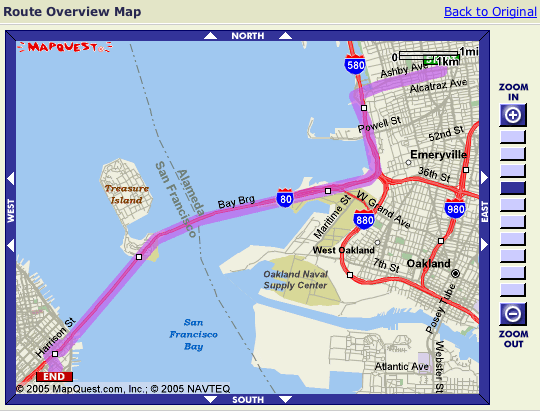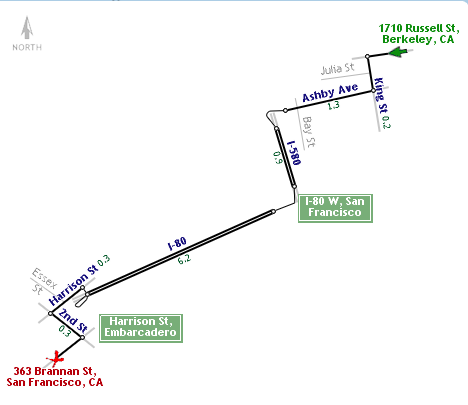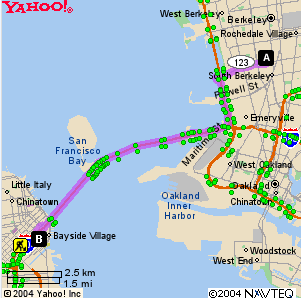February 11, 2005
Wherever you search, there you are
So, there's definitely boatloads of buzz about Google Maps, thanks to what might be the slickest presentation of any application on the web.
Maps and driving directions have long been one of the killer apps of the Web. It's such that it's hard to remember what it was like pre-Web, getting lengthy directions from friends, or puzzling over torn and stained maps. Maps are one place where our cultural behavior fundamentally changed -- when having a party, it's perfectly acceptable supplying just your address and maybe a link to it on Mapquest -- we know that our guests can figure out the rest.

Maps on the Web haven't seen a lot of evolution since MapQuest launched in 1996. They've mostly just larded them up with paid placements -- don't you want to find a Holiday Inn near wherever it was you were searching?
Many moons ago, I wrote about a map rendering engine that became LineDrive, now available through MSN's mapping tool.

This was pretty much the only innovation in mapping for years, until very recently, when Yahoo included traffic on your Maps.

(The traffic is good 'cause I grabbed this at 10:15p)
But all these innovations stayed within the same interaction model -- type in addresses, submit, wait for the next page to load, see a result. If you want to move around the map, you click arrows around the outside of the map, and wait while the page reloads. Just last weekend, I used Yahoo Maps to get directions to a friend's place for the Superbowl, and spent many minutes zooming, clicking arrows, and all trying to get oriented.
Google Maps, apart from simply looking good, changes everything through one simple thing -- panning. (It's also nice that you can make the map as large as your browser window). No longer do you have to zoom out, re-center, zoom in, wait for reloads, all that. Maybe it's just the novelty, but I love entering driving directions, zooming in so I can't see the whole thing, and click the numbers down the right hand side of the page, imagining the car following the purple route.
February 08, 2005
Prohibitions and Restrictions on Items Mailed to the United Kingdom
In researching the cost of sending a letter-size envelope to London ($.80, so now you know), I stumbled upon a page detailing Country Conditions for Mailing - Great Britain and Northern Ireland. I will quote the prohibitions and restrictions in full:
ProhibitionsAny postal item containing enclosures addressed to different persons at different addresses.
Arms and parts of arms, except as noted under Observation #5 below.
Articles, goods infringing British trademarks or copyright laws.
Cards decorated with mica or ground glass or similar materials unless they are placed in envelopes.
Citizens Band Radios, walkie-talkies, microbugs, and radio microphones that are capable of transmitting on any frequency between 26.1 and 29.7 megacycles per second and 88 to 108 Mhz per second.
Goods made in foreign prisons, except those imported for a non-commercial purpose or of a kind not manufactured in the UK.
Horror comics and matrices.
Obscene articles, prints, paintings, cards, films, videotapes, etc.
Perishable infectious biological substances.
Seal skins except those from an accepted source.
Switchblade knives.
Restrictions
Coins; banknotes; currency notes (paper money); securities payable to bearer; traveler's checks; manufactured and unmanufactured platinum, gold, silver; precious stones; jewelry; and other valuable articles, may only be sent in registered letter-post shipments or insured parcel post.
Foods or beverages to which any preservative or other substance has been added must comply with the British regulations for importation.
Live bees.
Live queen bees must be accompanied by an import license issued by a UK Government Agricultural Department and a health certificate issued by the appropriate Government Department of the country of origin stating that the bees are free of disease.
Meat, meat products, and animal products including dry sausage and dried milk require import license issued by appropriate UK Agricultural Department.
Plants and parts of plants require import permit issued by the appropriate Agricultural Department in UK.
That, my friend, is Comedy Gold. I see Harper's mined it as such a couple of years ago.
Oh, and if you were wondering what horror matrices are (as I was), M-W tells us that, a matrix is (among other things)
2 a : a mold from which a relief surface (as a piece of type) is made b : DIE 3a(1) c : an engraved or inscribed die or stamp d : an electroformed impression of a phonograph record used for mass-producing duplicates of the original
